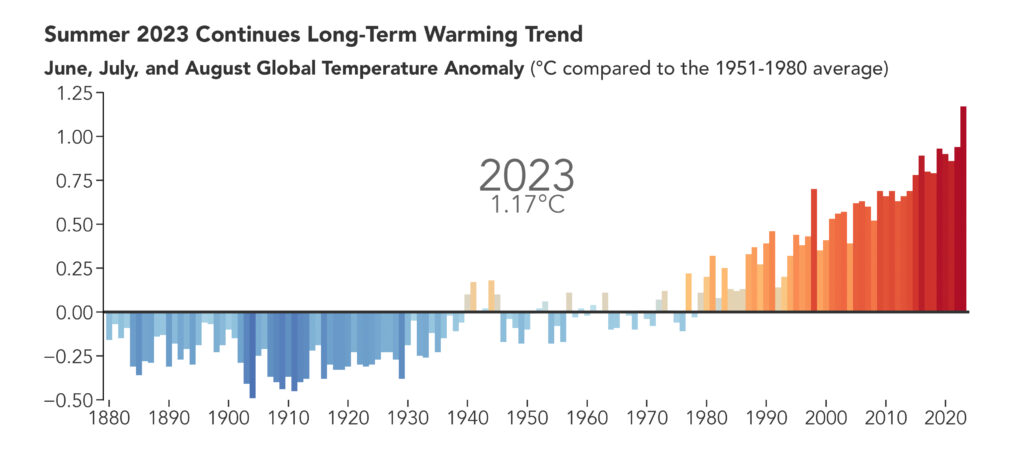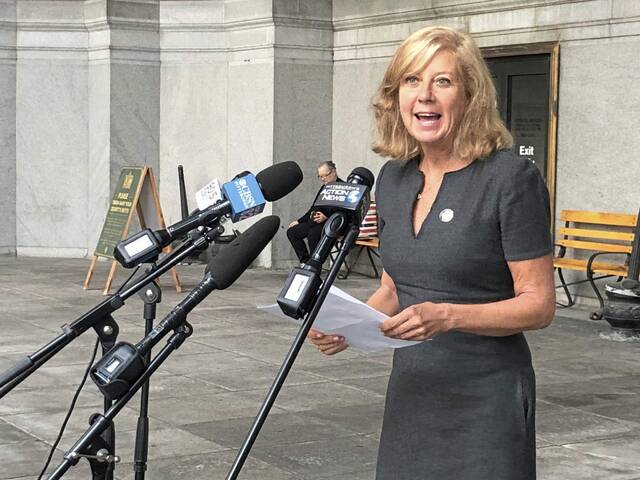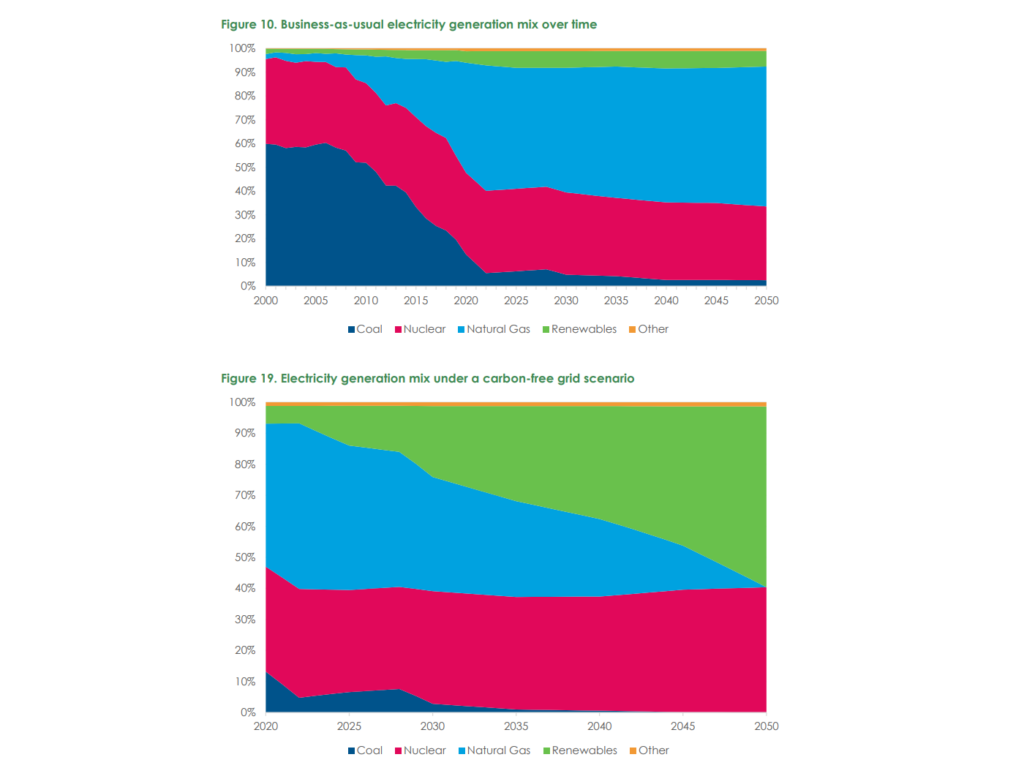As this post goes live, Climate Week, which runs September 17-24, is also getting started in New York City. [1] Ever-increasing attention is falling to the climate as we consistently break global temperature records. In January of this year, the World Meteorological Organization confirmed that the previous eight years were the warmest on record, [2] and NASA has already announced that the summer of 2023 is now the hottest since recordkeeping began in 1880. [3] It’s not just an issue of comfort: increasing temperatures also increase the risk of droughts, wildfires, severity of storms, and spread of disease. More governments are beginning to recognize the need for action and are taking steps to mitigate their impact – and Allegheny County (home to Pittsburgh) is joining those ranks.

Image credit: [4]
Allegheny County’s Climate Action Plan
About three weeks ago, Allegheny County Council voted 15-0 to pass an ordinance that will compel the county’s Department of Sustainability to draft an action plan for the county by July 1, 2024. [5] The move to create a formal plan appears to have been influenced by the fact that both the State of Pennsylvania and the City of Pittsburgh have climate action plans of their own, as detailed in the ordnance’s lengthy preamble. [6] The sections of the ordinance itself are incredibly brief, noting the timeline and parameters of next steps in three brief sentences:
The Allegheny County Department of Sustainability shall formulate, develop, and present to Council and the Chief Executive a Climate Action Plan for Allegheny County no later than July 1, 2024. Such plan shall be consistent with the goals established by the City of Pittsburgh and Commonwealth of Pennsylvania Climate Action Plans to the extent practicable. Once presented to the Council and Chief Executive, the plan shall become effective via duly enacted ordinance of the County.
Because the County’s plan is supposed to follow the City’s and State’s plans to the extent that it is feasible to do so, it is worth taking a look at those parameters as well to get a better sense of the types of goals that the County might create and how they’ll measure success.

Image credit: [7]
Benchmarks from Above and Below
In 2007, the City of Pittsburgh signed onto the U.S. Mayors Climate Protection Agreement, committing to take steps prioritizing climate change mitigation measures on the local level. In 2017 – around the time of Donald Trump’s pithy but poorly-researched “Pittsburgh, not Paris” sound bite [8] – Pittsburgh was releasing the third iteration of its Climate Action Plan (CAP). CAP 3.0 sets greenhouse gas emissions reduction goals at 50% below 2003 levels by 2030. The 78-page document also lays out strategies for energy generation & distribution, buildings & end use efficiency, transportation & land use, waste & resource recovery, food & agriculture, and urban ecosystems. [9]
Pennsylvania’s Department of Environmental Protection has taken the lead on the State’s Climate Action Plan since 2008 when the PA Climate Change Act required the creation and regular updates of such a plan. The most recent version, from 2021, calls for GHGs to be reduced 26% from 2005 levels by 2025 and 80% by 2050. In addition to GHG reduction tactics, this 278-page document also describes strategies for identifying and adapting to the effects of increased climate change, including heat, flooding, and landslides, among others. [10]
The Fine Print
I will note that the Pittsburgh plan references converting coal-fired power plants to gas-fired plants as a pathway to decarbonization, rather than phasing out fossil-based generation altogether. It seems the mentality in this plan is still based on utilizing fossil gas as “bridge fuel” on the assumption that it is at least better than coal, if not perfect. The general awareness on that front has been changing since 2017: methane is a significant climate-warming gas, and the prevalence of leaks in gas infrastructure counteracts the benefits touted in the industry, which claims that gas is better for the climate because methane burns clean. [11]

Image credits: [12]
The state plan unsurprisingly makes note of natural gas being a huge economic driver for the state, as it has now surpassed nuclear as the biggest fuel source for electricity generation. A business-as-usual projection shows gas making up 58% of our grid mix by 2050 (with nuclear holding steady at about one third). An alternate projection shows the potential for eliminating gas use by 2050, with renewables displacing them entirely. However, there are mentions of other technologies, such as hydrogen as a decarbonized “clean” fuel, and as I have described before, hydrogen isn’t necessarily “clean,” especially if it makes use of fossil fuels in the generation process. [13]
I can’t imagine the gas industry does not have a Plan B in place if there is any chance that their product is on track to be eliminated as the state’s primary fuel source for electricity production in less than 30 years. Given that, it’s up to those of us who are concerned about climate change to watch closely to see how words like “clean” are defined in policy. Does it mean using fossil fuels to create a different fuel source that has zero emissions at the point of combustion? Does it mean capturing CO2 created in the process and calling process “net zero”? If these loopholes are concerning to you, then I suggest you read up on Blue Hydrogen and its companion Carbon Capture and Sequestration.
And if you live in Allegheny County, you can also reach out to your representative [14] to let them know you’re paying attention and want your concerns addressed in their upcoming climate plan. Anita Prizio (District 3) is chair of the Committee on Sustainability and Green Initiatives, and she sponsored the ordinance for the County’s climate plan. The other committee members are Liv Bennett (District 13), Tom Duerr (District 5), Paul Klein (District 11), Bob Macey (District 9), Michelle Naccarati-Chapkis (District 8), and DeWitt Walton (District 10). Remember: a representative democracy works best if we let our representatives understand our priorities.
~
Let me know if you have thoughts, questions, or suggestions for more detail on relevant topics that will help you stay more informed and get involved.
In the meantime, thanks for reading!
[1] https://www.climateweeknyc.org/
[2] https://public.wmo.int/en/media/press-release/past-eight-years-confirmed-be-eight-warmest-record
[3] https://climate.nasa.gov/news/3282/nasa-announces-summer-2023-hottest-on-record
[4] https://www.nasa.gov/press-release/nasa-announces-summer-2023-hottest-on-record/
[5] https://triblive.com/local/allegheny-county-to-draft-climate-action-plan/
[7] https://triblive.com/local/allegheny-county-to-draft-climate-action-plan/
[8] https://www.theguardian.com/us-news/2017/jun/01/pittsburgh-fires-back-trump-paris-agreement
[9] https://apps.pittsburghpa.gov/redtail/images/7101_Pittsburgh_Climate_Action_Plan_3.0.pdf
[11] https://radicalmoderate.online/renewable-energy-and-energy-independence-part-2/
[13] https://radicalmoderate.online/hydrogens-rainbow/
[14] https://www.alleghenycounty.us/county-council/council-members.aspx
0 Comments